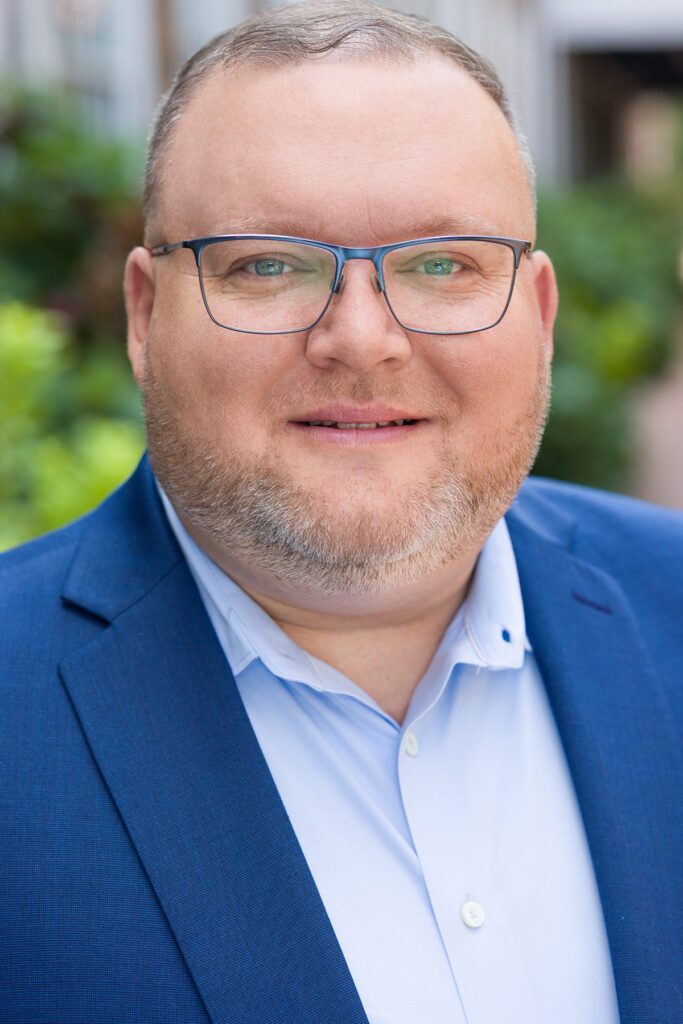Brad Jordan: From Firehouse to Hospital CEO
Oct 16, 2025Brad Jordan always thought he’d become a teacher. But growing up just doors away from his grandmother—frequently visited by EMS and the fire department—sparked a curiosity about healthcare.
At 16, he joined the Monroeton Fire Department. “I thought, this is cool. I could see myself doing this,” he said.
With limited family resources for college, Jordan discovered that volunteering with fire or police agencies in North Carolina could cover much of his education. After graduating from Rockingham County High School in 2002, he enrolled at Rockingham Community College, completing EMT and Paramedic programs by 2006—both tuition-free.

In 2011, Jordan became a full-time program director at RCC and began developing new allied health programs based on community needs, including Dialysis, Central Sterile Processing, and Chiropractic Assistant. He also launched RCC’s first hybrid EMT and Paramedic programs.
Jordan soon blended his passions for healthcare and teaching. He became an adjunct instructor at RCC, worked full-time for Rockingham County EMS, served as a clinical educator at Annie Penn Hospital, and earned an associate degree in Emergency Medical Science from Davidson-Davie Community College. He later completed a bachelor’s in Management and Business Ethics from Laurel University.
Inspired by his colleagues’ advanced degrees, Jordan pursued a master’s in Health Administration from Pfeiffer University—driving to Greensboro twice a week for two years. He graduated on a Saturday, and on Monday started a new job as a dean at Piedmont Community College. Still surrounded by highly credentialed peers, he pushed further, earning a doctorate in Health Administration from the Medical University of South Carolina.
Craving hands-on care again, Jordan became EMS director and chief paramedic officer in Caswell County. But a connection from his doctoral program soon led him to an unconventional opportunity: leading emergency departments at a hospital in Indiana—despite not being a nurse. “It was a huge challenge, disrupting the status quo,” he said.
After two years in Indiana, the family relocated to the warmer climate of Tampa, Florida, where Jordan served as VP of Emergency Services, overseeing nine ERs. Then COVID hit. “It was tough. I started second-guessing everything,” he said. Burned out and constantly on call, he sought change.
Jordan became CEO of Select Medical in The Villages, Florida, achieving his goal of becoming a CEO by age 40. But his family yearned for home. “My kids missed their grandparents, my wife missed her parents,” he said.
In February 2023, during his son’s 16th birthday celebration, Jordan spotted a hospital CEO job listing in Greensboro—posted by his own company. He applied immediately. A month later, while in town for his mother’s surgery, he interviewed. By May, he was commuting from Reidsville.
Now back in Rockingham County, Jordan’s children attend local schools: a senior and freshman at Rockingham County High, and a fifth grader at Monroeton. He encourages his kids to consider community college. “I tell my son I’m fine with him going straight into the workforce, but want him to do something at RCC. I tell my daughter she can get a two-year degree at RCC and transfer. I just want them to have something to fall back on.”
…..
Brad Jordan is now CEO of Select Specialty Hospital, a 30-bed long-term acute care facility for patients requiring extended hospital treatment—typically more than 25 days. The hospital treats complex conditions such as non-healing wounds, cardiac, neurological, and renal disorders, infectious diseases, traumatic brain injuries, surgical complications, and orthopedic issues.
From his office on the sixth floor of Moses Cone Hospital, where Select Specialty leases space, Jordan reflects on his journey.
“Rockingham Community College was my gateway to education. I never thought I’d go to college, but enrolling in the EMT program gave me a dose of college—and I liked it,” said Jordan, the first in his family to attend college.
He appreciated the diversity of RCC’s classrooms. “You learn from people of all ages and backgrounds, all walks of life,” he said.
At Laurel University (formerly John Wesleyan College), Jordan minored in Christian leadership, which shaped his ethical approach to leadership. But it was RCC’s EMT and Paramedic programs that taught him the human side of healthcare.
“That was the nitty gritty—how to care for people, not just clinically, but emotionally and mentally. You learn to have serious conversations with families in crisis,” he said.
Jordan credits RCC with teaching him how to communicate compassionately with patients, families, and colleagues. His advanced degrees later formalized those skills.
“Community colleges are the foundation of education in our communities. I’m a huge advocate,” he said. “I always encourage people to go back to school—get your bachelor’s, your master’s, even your doctorate.”
He added, “Licenses and certifications can expire. But my degrees are mine forever. Education is something no one can take away from me.”
~Story by Gerri Hunt, RCC Director of Public Information

